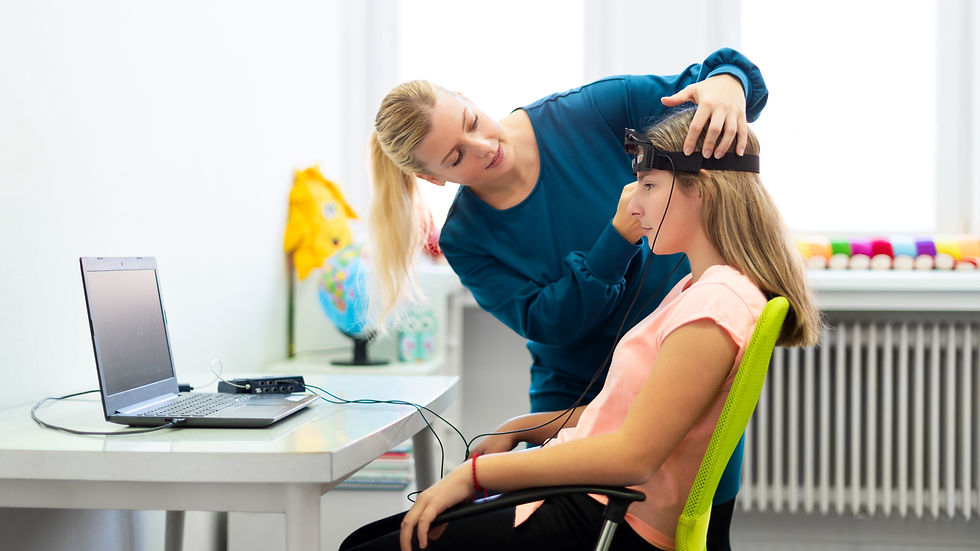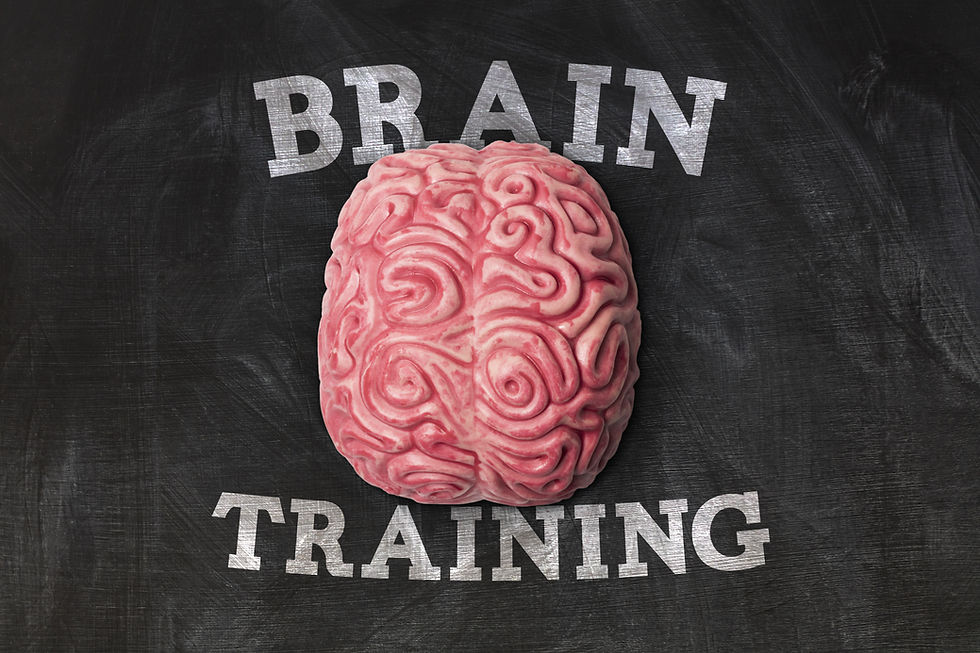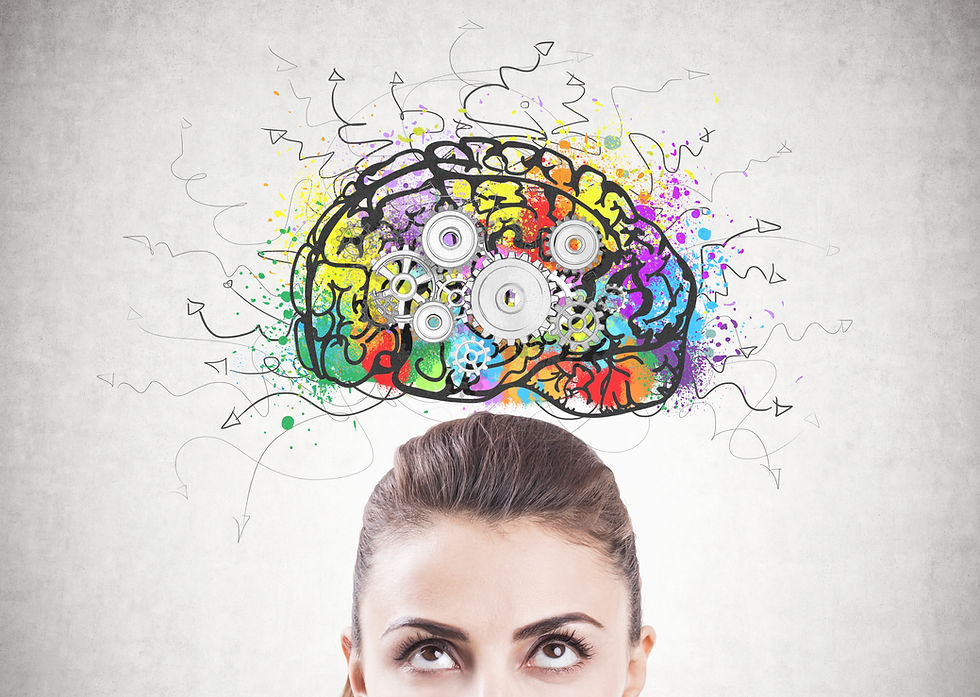
Is Neurofeedback Effective & What is it Used For?
Neurofeedback has been around for the last 50+ years. In those years, there have been over 3,000 research articles written on the effectiveness of neurofeedback. The last couple of decades has also brought us significant knowledge of how the brain operates. This has allowed us to identify regions in the brain that play a role in emotional and behavioral struggles. Neurofeedback is one of the only therapeutic approaches that is able to identify, with precision, what regions in the brain are playing a role in the emotional and/or behavioral struggles.
Neurofeedback has a wide variety of applications. A few of it's applications are as follows:
Neurofeedback for teen anxiety
Neurofeedback for teen panic attacks
Neurofeedback for teen trauma
Neurofeedback for teen PTSD
Neurofeedback for teen depression
Neurofeedback for stress
Neurofeedback for headaches/migraines
Neurofeedback for sleep issues
Neurofeedback for peak brain optimization for academics & athletics
So now that we know that neurofeedback is effective and the variety of concerns it is good for, how does it work?
How does Neurofeedback Work?
Neurofeedback works by using sensors that record brain activity. A cap with 19 sensors is placed on your head. Those sensors pick up the electrical signals the brain produces. These electrical signals are the method by which the various regions of the brain communicate with each other. These electrical signals speed down the neurons communicating with other neurons at over 100 miles per hour.
Often, the way our brain communicates, or performs, is ideal and optimal. Sometimes, whether through genetics, the environment were in, or both, some regions of the brain may not perform at optimal levels. There are also times where certain regions of the brain perform well below optimal levels. The brain performing well below optimal levels can cause a teen to experience difficulties. Teen ADHD, teen depression, teen anxiety, and other struggles are among a few of theses struggles.
Neurofeedback helps train the regions of the brain that are performing at sub-optimal levels to perform at optimal levels. Neurofeedback corrects this through brain training. Through this training, teen ADHD, teen depression, teen anxiety, and other teen struggles can be effectively resolved.
How do you Train the Brain?

The brain is a sensory and novelty seeking organ in our body. Our environment sends approximately 11 million bits of information per second to our brain. It process information as fast as 13 milliseconds. Neurofeedback uses sensory stimulation to reward the brain in novel ways.
Starting out, the client is seated in a comfortable chair often with their feet up on an ottoman. We then place the cap with 19 sensor on the clients head and use sophisticated software to record the brain's performance. We compare how the client's brain is performing against a data base of optimally performing brains of people the same gender and age of the client.
The software creates a 2-D and a 3-D model of the client's brain, mapping the performance of the brain. When we compare the map of the client's brain to the map of the optimally performing brain, we identify what regions of the brain that may be causing the emotional and/or behavioral struggles.
Once we identify those areas of the brain that require clinical attention, we begin the brain training. One way we do this at Katy Teen & Family Counseling is through a platform that is much like a video game. But, this video game is not played with a control but rather through the brain's performance.
As the teen watches the screen and when the teen's brain performs at optimal levels for the regions identified, the teen can control the character on the screen. When the teen's brain is not performing at optimal levels for those regions identified, the teen can no longer control the character on the screen. Over time, the brain learns through reinforcement in being able to control the character to shift from sub-optimal performance to optimal performance. In this way, teen ADHD, teen depression, teen anxiety and other teen struggles are resolved.
The client usually begins noticing change after around 20-30 sessions. Neurofeedback does requires a time commitment on the part of the client. Sessions usually last around 60 minutes and teens are required to attend from 2-4 times a week.
Common Emotional and/or Behavioral Struggles Neurofeedback Helps to Resolve

At Katy Teen & Family Counseling, we have observed common trends and themes among our teens who are entering therapy. Teens are coming in with very similar emotional and/or behavioral struggles. The good news is that they are not alone AND there are a variety of talk therapy approaches in addition to neurofeedback. There are times where combining talk therapy with neurofeedback result in a powerful approach in treating teen struggles. For those in the Katy and Houston areas, we provide a variety of neurofeedback services including but not limited to:
Neurofeedback for ADHD Treatment
Neurofeedback for Anxiety Treatment
Neurofeedback for Depression Therapy
Neurofeedback for PTSD Treatment
Neurofeedback for Trauma Therapy
Neurofeedback is also effective for those who do not struggle with emotional and/or behavioral concerns. A teen student or gifted student wanting to optimize brain performance for academic reasons can benefit from peak academic performance training. A talented teen athlete wanting a competitive edge can also use neurofeedback for peak athletic performance.
There are wide ranging opportunities neurofeedback to help you in your life. It is the one therapeutic approach where the neurotherapist is able to identify with accuracy where in the brain the issue is stemming from. It is the one therapeutic approach that can specifically treat the source to help teens overcome teen ADHD, teen depression, teen anxiety, teen trauma/PTSD or other struggles.
Begin Neurofeedback at Katy Teen & Family Counseling: Serving Katy & Houston

You don't have to live with teen ADHD, teen depression, teen anxiety, teen PTSD or other struggles any longer. At Katy Teen & Family Counseling, we can help you through effective approaches like neurofeedback. Our caring neurofeedback therapist is here to help you and your teen. To start your neurofeedback journey, you can follow these three simple steps:
Contact Katy Teen & Family Counseling
Meet with our specialist in neurofeedback
Start your neurofeedback journey and leave the emotional and/or behavioral struggles behind.
Other Teen Counseling & Therapeutic Services at Katy Teen & Family Counseling
At Katy Teen & Family Counseling, we have therapists for teen depression, provide anxiety treatment, counselors who specialize in trauma, PTSD treatment, and other services. Below is a list of all our services:
Neurofeedback in Katy and the Houston Area
Neurofeedback for Gifted Students (Peak Performance optimizing for academic skills)
Neurofeedback for Talented Teen Athletes (Peak Performance optimizing for athletic ability)
Neurofeedback for ADHD/ADD
Neurofeedback for Depression Counseling
Neurofeedback for Anxiety Treatment
Neurofeedback for Anger Management
Neurofeedback for Panic Attacks
Neurofeedback for Sleep Problems
Neurofeedback for Trauma Therapy
Neurofeedback for PTSD Treatment
Neurofeedback for Substance Use Treatment
EMDR in Katy and the Houston Area
EMDR for Teen Trauma Therapy
EMDR for Teen PTSD Treatment
EMDR for Teen Anxiety Treatment
EMDR for Teen Depression Counseling
EMDR for Teen Peak Performance
Cognitive Behavioral Therapy (CBT) in Katy and the Houston Area
CBT for Teen Depression Counseling
CBT for Teen Anxiety Treatment
CBT for Trauma Therapy for Teens
CBT for PTSD Treatment for Teens
Family Therapy in Katy and the Houston Area
At Katy Teen & Family Counseling, we believe strongly in involving the family. Research shows that the gains the teen makes in individual therapy are sustained longer when the family participates in the teens therapy. As parents, you bring a wealth of knowledge, expertise, and background history that aides in a richer therapeutic experience for the teen. You will also learn more about your teen and how to best support your teen in their growth and development.
Don't Wait - Call Katy Teen & Family Counseling Today
Reach out today and talk with our neurofeedback therapist, Jason Drake, LCSW-S. Jason is a Biofeedback Certification International Alliance (BCIA) professional. BCIA is the main certification body in America and internationally for neurofeedback.
Jason has specialized in teen counseling and family therapy starting in 2003. Down to earth, he will help you feel comfortable when you reach out and can provide you the help you need.
How to Begin Teen Therapy or Family Counseling
To begin teen therapy or family counseling, simply contact Katy Teen & Family Counseling through our website or by calling 346-202-4662. Our Owner and Lead Clinician answers each phone call to help match you with the right therapist for you teen and family.
About the Author

Jason Drake is a Licensed Clinical Worker. He is a Specialist in Teen Therapy & Family Counseling. He has provided therapy to teens and families since 2003.
Through his expertise, he helps teens who struggle with depression, anxiety, trauma, ADHD/ADD, and PTSD.
He works with talented teen athletes who have experience mental blocks. Gifted students have unique challenges that Jason understands well.
Jason uses CBT, EMDR, Neurofeedback, FFT, and Motivational Interviewing. We only work with teens and families which allows us to focus on what teens and families of today need. Resolving the struggles of today can assure a more successful tomorrow. Proudly serving Katy, Tx and Houston.

Comments